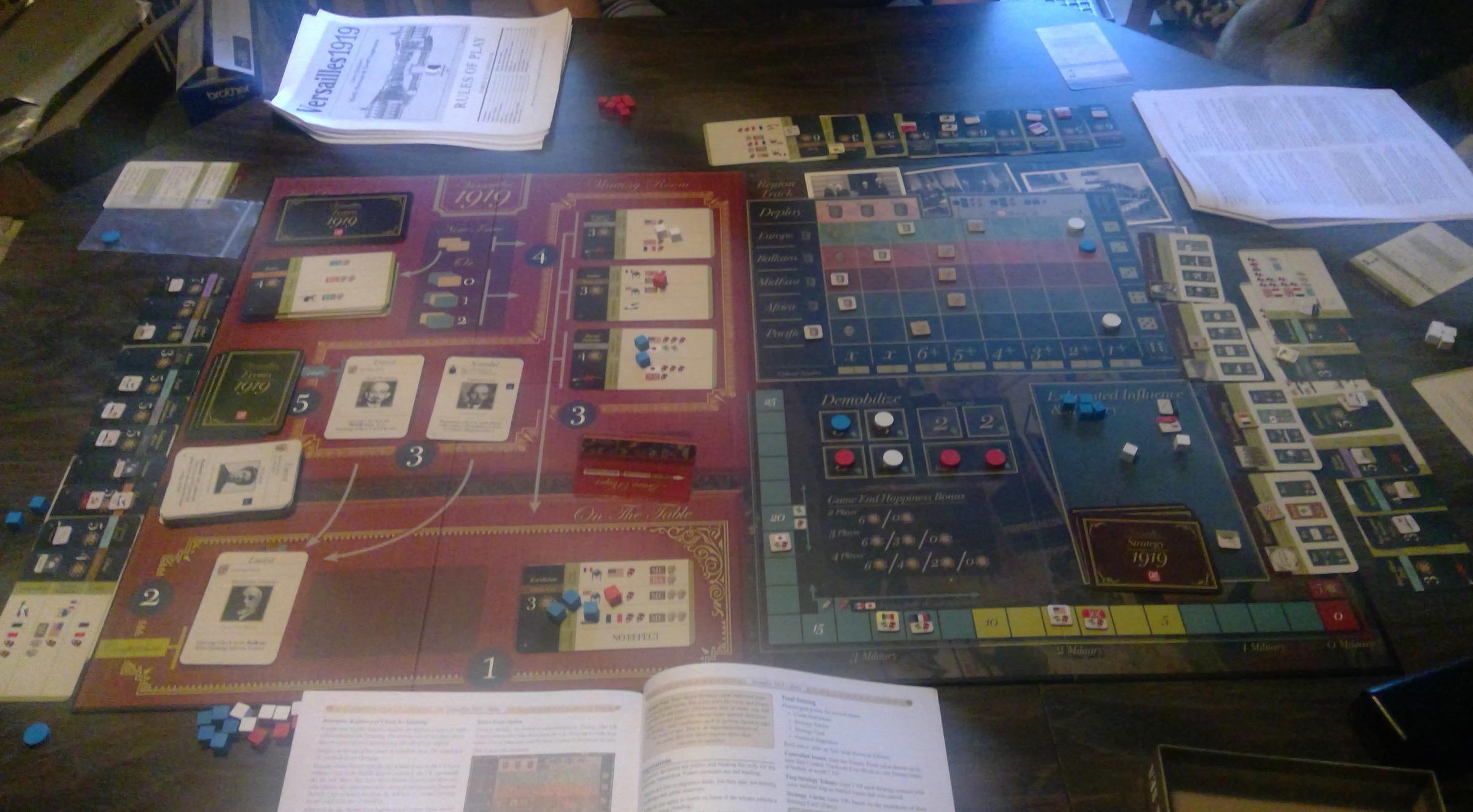Nation Building at Versailles
Back on the 26th, I managed to get Mark and Jason over for a three-player day. We tried out Mark’s copy of Versailles 1919 (Mark and I have a trial game of it on Vassal which is still on-going).
It’s a good design, but it takes a bit of getting into, since there’s lots of unfamiliar mechanics. The board does a nice display of nearly everything you need to know, though it took a while for me to realize all the big numbers were actually showing the order to do the main action in.
The general idea is that issues come up, and are ‘on the table’, until they get resolved, and the nation with the most influence on them gets control of the issue (this feels a bit like the PP in Origins of WWII, but here you have to recycle influence instead of getting a set amount each turn). The resolution provides various “resources” in various post-war politics (like isolating Germany), and will often make various people unhappy. The major nations’ happiness is on a track, the the populations of most of the world can have unrest, which can turn into an uprising, that causes a settled issue to become up for grabs again. It’s a fairly chaotic system, but, you still feel like you are in control. That’s a fine line to walk.
Another interesting bit is that after the first uprising everyone chooses their goals. You get victory points for having controlled an issue, and for controlling tokens with your empire on them. You also get points for how many tokens aligning with your strategy are out there at all (we didn’t look up the details of scoring until we were done, and that surprised us). There’s a small deck of these strategies, and the ones in play are put out at the beginning, but you don’t know which one is yours at first.
I actually got off to a decent start as France. The initial rounds were so-so, but I managed to start using the cycle of tokens to get some early bigger issues. The initial uprising turned out to be in Europe (I’m sure that’s common), and Jason, as the US, had a good collection of those. So, Disarmament came up for re-settling. And then it came up again. And again. And again. Eventually, I got control of it instead of Jason, which broke that cycle (and… Prussia, I think, ended up with Mark).
We forgot to pick goals the first few times as we got so buried in the process of uprisings, and settling issues, it got forgotten for a while. But by the time it happened, I had a narrow lead on issues, so Jason picked Mobilization, Mark took Reparations, and I chose Nation Building (with Contain Communism as the unpicked strategy).
Mark concentrated on keeping England happy at first, but took some nasty hits about… two-thirds of the way through, and sank fast. France’s happiness suffered for a bit, but I took the first demobilization (I think an event encouraged it), and ended at 12, which was notably higher than England and America. I had also managed to do very well with settling issues, and ended up with quite a collection (though I did lose Disarmament back to Jason near the end). The ending dragged out a bit, since no one was particularly motivated to settle Game End, but after a few other issues passed it, it got settled by Jason.
The final scoring was a surprise. Mark had done well on issues, with 50 VPs to my 52, while the constant bleed of European issues had helped suppress Jason’s collection, which ended at 37 VPs. However, Mark was at the bottom in happiness (Reparations doubles the score for that; 0) only had settled one reparations issue, and got 10 VP overall for his goal, and had three British tokens, for a total 63. Jason did well with reparations and empire building, and did okay with everything else for a final total of 61 VP. I only picked up 2 French tokens, but did well with empire building and naval squadrons, got Italy to not sign the treaty, four regions were pretty restless, and of course, I got the 6 for highest happiness, for a grand total of 78 VP.
We’re all liking the game in general, and this is going to have to make a return appearance sooner rather than later!


Discussion ¬